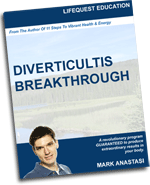|
Hyperhydrosis | Contact 
|
Self Care
Self-Care For Mild Diverticulitis
If you have been diagnosed with having mild diverticulitis you have more than likely been given oral antibiotics and orders to rest and eat a liquid or low-fiber diet. You are extremely grateful that your diverticulitis did not turn out to be severe or that you did not experience any complications from the disease. You do however, wish to learn all you can about self-care that you can do at home to help your body heal from this attack of diverticulitis and to help prevent further flare-ups of diverticulitis. Here are some tips that you can use to help you in your goal.
Your doctor will guide you in how to gradually increase your fiber so that your body can adjust to the fiber without causing you to have increased gas or bowel discomfort. Your doctor may even send you to a nutritionist who will teach you all about a high-fiber diet. You will be told about how important it is for you to maintain a high-fiber diet because fiber in your diet keeps your stools soft so that they are easier to pass and do not require pushing or straining on your part.
The diet is probably the single most important part of your self-care regimen. You should really learn all you can about the foods that contain fiber and the different ways to cook them so that they can be more appealing to you and to the other members of your family (why should you be the only one eating healthier?).
Most dieticians will tell you to aim for 25 to 30 grams of fiber each day (once your body is used to fiber).
Besides diet, you can also do other things to help prevent further flare-ups of diverticulitis such as making sure that your body has the liquids it needs to function properly and to move the bowels correctly. Because fiber works by absorbing water and increasing the soft, bulky waste in your colon, if you do NOT drink enough water, the fiber that you are eating will act to constipate you, which will then have the opposite effect than what you wish on your bowels...it will act to constipate you. Constipation causes you to strain and push hard to expel the stool and when you do this you create pressure in your colon, which results in diverticula forming. Drink water at least eight 8oz glasses of water every day.
Another important self-care tip is to make sure that when you feel the urge to move your bowels that you pay immediate attention to these urges and act on them. When you delay having a bowel movement the stools become harder which can lead to constipation and increased colonic pressure, which leads to more diverticula being formed.
The last tip on self-care is to exercise on a regular basis. Strive for at least 30 minutes of exercise each day that includes walking, swimming, jogging or aerobics; anything to get your body moving. Exercise promotes normal bowel function and also helps to reduce the pressure inside of your colon.

News About Diverticulitis |
More Articles
Risk Factors For Diverticulitis And Simple Steps To Prevention
How To Diagnose Diverticular Disease
Complications Of Diverticulitis (2)
How Will My Diverticulitis Be Treated
The Cause And Diagnosis Of Diverticulitis
Complications Of Diverticulitis
Hospitalization Or Surgery For Diverticulitis
What Is The Diverticulitis Diet All About


|
Related Products And FREE Videos
More Articles
Alternative Treatments For Diverticulitis
... the diagnosis and to exclude other diseases that may mimic diverticular disease. In patients suspected of having diverticular abscesses causing persistent pain and fever, ultrasound and CT scan examinations of the abdomen and pelvis can be done to detect collections of pus fluid. Many patients with diverticulosis ...
Causes And Risk Factors Of Diverticulitis
... of having these diverticula in the colon is called diverticulosis. Diverticulitis is a serious disease which is both painful and dangerous. Once diverticula, which are small sacs, grow on colon walls, they will not heal. Inflammation and rupture of these sacs may cause serious and life threatening infections. ...
... increases with age and is uncommon before the age of forty. Most patients with diverticulitis develop bleeding, infection, constipation, abdominal cramps, and occasionally, colon obstruction. Typically, a diet with adequate fiber produces stool that is bulky and can easily move throughout the colon. A ...
Treatment Options For Diverticulitis
... first surgery will be to clear the infected abdominal cavity and to remove any part of the colon that is damaged. It is usually not safe to rejoin the colon during this first operation, so the surgeon will create a temporary hole, or stoma, in the abdomen in which the end of the colon is connected to ...
Types Of Diverticulitis Features And Treatment
... without sepsis, and the presence of a perforation, abscess, fistula or an obstruction. The treatment for diverticulitis uncomplicated in stable patients is to administer oral antibiotics and to place the patient on a clear liquid diet, it is advised not to give morphine (Duramorph) because of the risk ...
